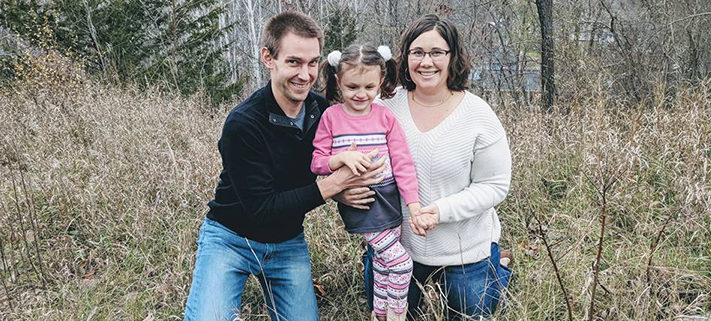Pray, Christian, pray!
We are to pray at all times. When one engine of Southwest Flight 1380 exploded forcing an emergency landing, prayer became vital.
Alicia A. Neumann
Timothy Bourman, pastor at Sure Foundation, Queens, N.Y., says he’s been doing a lot of praying in the aftermath of his flight on April 17, 2018. Bourman was heading to San Antonio, Texas, with his wife, Amanda, to attend Wisconsin Lutheran Seminary’s Grow in Grace retreat and celebrate his 10th year in the ministry. But the Bourmans never made it to Texas.
A terrifying experience
“It seemed like any other flight,” says Bourman. “It was totally packed. We had checked in almost last, and thankfully we found two seats together in the back of the plane.” After they were settled into their seats, the Bourmans started playing Sudoku to pass the time.
“Right after we finished the puzzle, I heard a loud blast,” he says. “One side of the plane just completely dipped. It felt like a nosedive, a descent like I’ve never experienced. The engine was gone; there was no power left. Our masks came down. I thought this was it. This was the end.”
Shrapnel from the engine had blown out the window, and the cabin depressurized. “It was terrifying. It was a scene I never want to see again.” Bourman says the first thing he did was start praying. “I grabbed Amanda’s hand and said, ‘Dear Jesus, send your angels.’ ”
After they finished praying, the Bourmans tried to turn on their phones to get a message to their daughters, Tayley (6), Brooke (4) and Felicity (2). But they couldn’t get reception. So in the midst of all of the chaos, they managed to purchase in-flight wifi and got a message to go through. “It was all garbled. It said, ‘Pray. Engine exploded. We are going to try to land. Tell the girls that we love them and to never lose their faith in God,’ ” says Bourman. “I was thinking about my daughters and how it would be after God takes their Mommy and Daddy away from them when they are so young. And I just didn’t want them to lose their faith. So I wanted them to have a text message from Mom and Dad that they could always have.”
Soon, they heard the pilot’s voice over the speakers, saying they were going to make an emergency landing in Philadelphia. “I didn’t think we would make it,” says Bourman. “When we came below the clouds and I could see the ground, the flight crew was yelling, ‘Brace for impact, brace for impact!’ I put my head up against the seat ahead of me and held on.”
Bourman says the landing was “rather intense,” but by the grace of God, they didn’t crash. “It was quite amazing, the whole thing,” he says. “It took 22 minutes from the time the engine blew until we landed. I knew everything was in the Lord’s hands, one way or another, but until the plane actually came to a stop I didn’t think we were going to make it.”
As soon as they landed, Bourman started high-fiving the passengers around him. “The guy who was sitting next to me said, ‘You were so calm! You kept me and everyone else around you calm too.’ But I didn’t feel calm,” he says. “At that point everyone was trying to figure out what just happened to us.”
Meanwhile, firefighters had rushed onto the plane to help the injured passengers, and the pilot, Tammie Jo Shults, came out of the cockpit and started personally ushering people out. The Bourmans were one of the last ones off the plane, and they shook the pilot’s hand and thanked her. “When I prayed to God to send his angels, he had already answered my prayer before I even uttered it,” says Bourman. “He sent Tammie to save our lives.”
The aftermath
When they were finally given the all-clear to leave, the Bourmans rented an SUV for their journey home. When they got back to New York a couple of days later, they didn’t waste any time reuniting with their daughters. The two older girls were in school, so the Bourmans met them there. They rushed into their daughters’ classrooms and hugged them. “The teachers didn’t know what was going on until we said, ‘We were on flight 1380,’ ” says Bourman. “It seemed like everyone knew about the flight but didn’t realize we were on it. So it was very emotional.”
Bourman said their homecoming was also very emotional for his father, James Bourman, who was watching Tayley, Brooke and Felicity, and had received the text message as the plane was going down. “For him, it was like getting a son back. He was just holding me.”
In the days that followed, Bourman says things got back to normal pretty quickly for his daughters, who never really grasped the gravity of the situation. But it was a different story for him and Amanda. Getting back to their regular lives was tough—especially when the media started calling.
“They found our numbers, and our phones started blowing up,” he says. “So Amanda and I just made a conscious choice: We were going to start telling people about what Jesus did for us.” Amanda shared her photo of the plane’s engine on Instagram, and soon the Bourmans were contacted by outlets like the Associated Press, CNN, New York Times and People Magazine. “We picked what we thought were the most powerful media out there, and we started taking interviews,” he says.
Bourman says it hasn’t been easy, but it’s good to talk about the experience. “I’ve been thinking about how the truth of the gospel worked in our hearts in such a way that we weren’t worried about whether we would meet God or not. What a way to live!”
He says he’s also been reflecting on all of his blessings, including the love and support he’s received from family, friends and his congregation. “I think we take for granted the gifts God gives us in a Christian church and Christian community,” he says. “These people are holding me up right now. It’s really beautiful stuff.”
Moving forward
Bourman says this whole experience has crystalized some things for him. “If I could share anything with my fellow believers, it’s pray. Pray with great expectations. God made a promise that if we call on him in our day of trouble, he will answer. We should take him up on this promise. I am living proof that God answers prayer.”
He also says he knows God will use all of this for his good. “It’s all still so new to me; I’m not sure of the profound impact it’s going to have on my life,” says Bourman. “But I do know that you can look at this and see a cloud of gloom, but that’s where the Scriptures help you give thanks for salvation and give you a resurrection perspective. Living in that thankfulness and looking at this and seeing the Lord’s hand in it makes all the difference in the world.”
Alicia Neumann is a member at Christ, Zumbrota, Minnesota.
SUBMIT YOUR STORY
Do you have a manuscript, idea, or story from your own life you’d like to share for use in Forward in Christ or on wels.net? Use our online form to share it to our editorial office for consideration.
SUBSCRIBE TO FORWARD IN CHRIST
Get inspirational stories, spiritual help, and synod news from Forward in Christ every month. Print and digital subscriptions are available from Northwestern Publishing House.
Author: Alicia A. Neumann
Volume 105, Number 7
Issue: July 2018
Copyrighted by WELS Forward in Christ © 2021
Forward in Christ grants permission for any original article (not a reprint) to be printed for use in a WELS church, school, or organization, provided that it is distributed free and indicate Forward in Christ as the source. Images may not be reproduced except in the context of its article. Contact us



